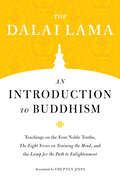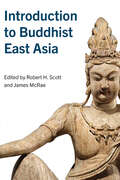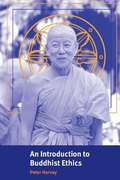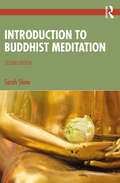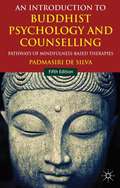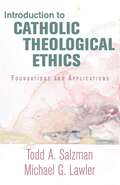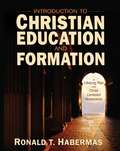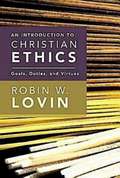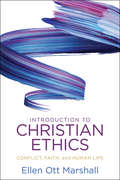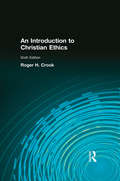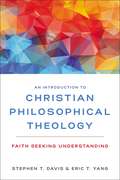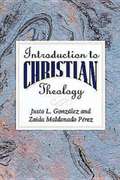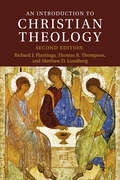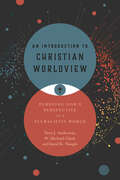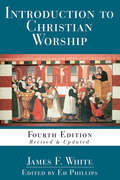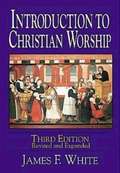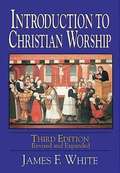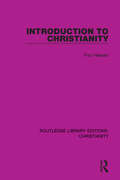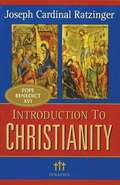- Table View
- List View
An Introduction to Buddhism (Core Teachings of Dalai Lama)
by The Dalai LamaThe "Core Teachings of the Dalai Lama" series begins with this small book of teachings by His Holiness, the perfect introduction to traditional Tibetan Buddhist thought and practice.There is no one more suited to introduce beginners—and remind seasoned practitioners— of the fundamentals of Tibetan Buddhism than His Holiness the Dalai Lama. Speaking to an audience of Western students, the Dalai Lama shows us how to apply basic Buddhist principles to our day-to-day lives. Starting with the very foundation of Buddhism, the Four Noble Truths, he provides the framework for understanding the Buddha’s first teachings on suffering, happiness, and peace. He follows with commentary on two of Buddhism’s most profound texts: The Eight Verses on Training the Mind and Atisha’s Lamp for the Path to Enlightenment, often referring to the former as one of his main sources of inspiration for the practice of compassion. With clear, accessible language and the familiar sense of humor that infuses nearly all of his work, the Dalai Lama invites us all to develop innermost awareness, a proper understanding of the nature of reality, and heartfelt compassion for all beings.This book was previously published under the title Lighting the Way.
Introduction to Buddhist East Asia (SUNY series in Asian Studies Development)
by Robert H. Scott; James McRaeThis anthology provides an accessible introduction to East Asian Buddhism, focusing specifically on China, Korea, and Japan. It begins with a detailed historical introduction that includes an overview of the development of the various schools of Buddhism in East Asia and traces the transmission of Buddhism from Northwest India to China in the first century CE, and then to Korea and Japan in the fourth and sixth centuries CE. The first part of the book contains five chapters that offer creative pedagogies that can help college professors infuse East Asian Buddhism into their courses. The second part includes six interdisciplinary chapters that explore thematic links between East Asian Buddhism and religious studies, philosophy, film studies, literature, and environmental studies.
An Introduction to Buddhist Ethics: Foundations, Values and Issues
by Peter HarveyThis systematic introduction to Buddhist ethics is aimed at anyone interested in Buddhism, including students, scholars and general readers. Peter Harvey is the author of the acclaimed Introduction to Buddhism (Cambridge, 1990), and his new book is written in a clear style, assuming no prior knowledge. At the same time it develops a careful, probing analysis of the nature and practical dynamics of Buddhist ethics in both its unifying themes and in the particularities of different Buddhist traditions. The book applies Buddhist ethics to a range of issues of contemporary concern: humanity's relationship with the rest of nature; economics; war and peace; euthanasia; abortion; the status of women; and homosexuality. Professor Harvey draws on texts of the main Buddhist traditions, and on historical and contemporary accounts of the behaviour of Buddhists, to describe existing Buddhist ethics, to assess different views within it, and to extend its application into new areas.
Introduction to Buddhist Meditation
by Sarah ShawThis lively introduction to Buddhist meditation offers students and practitioners alike a deeper understanding of what meditation is and its purpose and place in the context of different Buddhist schools. The historical background and geographical spread of Buddhist meditation is explored alongside an examination of the development of meditative practices. Chapters cover basic meditative practice, types of meditation, meditation in different regions, meditation and doctrine, and the role of chanting within meditation. Although not a practical guide, Introduction to Buddhist Meditation outlines the procedures associated with Buddhist practices and suggests appropriate activities, useful both for students and interested Buddhists. Vivid quotations from Buddhist texts and carefully selected photographs and diagrams help the reader engage fully with this fascinating subject.Thoroughly revised throughout, this new edition also features a glossary and key, making it ideal reading for students approaching the topic of Buddhist meditation for the first time.
An Introduction to Buddhist Psychology and Counselling
by Padmasiri De SilvaThis book, now in its fifth edition, provides a comprehensive introduction to Buddhist psychology and counselling, exploring key concepts in psychology and practical applications in mindfulness-based counselling techniques using Buddhist philosophy of mind, psychology, ethics and contemplative methods.
Introduction to Catholic Ethics
by Lucien F. Longtin Sj Andrew J. PeachThis book introduces students to the fundamentals of Catholic moral theology. By presenting testimony from the lives of great Christians and many of the key concepts that inform the Catholic approach to morality, this book provides a framework for making authentic Christian choices.
An Introduction to Catholic Ethics since Vatican II
by Andrew KimThis introduction provides a comprehensive overview of the development of Catholic ethics in the wake of the Second Vatican Council (1962–5), an event widely considered crucial to the reconciliation of the Catholic Church and the modern world. Andrew Kim investigates Catholic responses to questions of moral theology in all four principal areas: Catholic social teaching, natural law, virtue ethics, and bioethics. In addition to discussing contemporary controversies surrounding abortion, contraception, labor rights, exploitation of the poor, and just war theory, he explores the historical sources of the Catholic worldview. Beginning with the moral vision revealed through the person of Jesus Christ and continuing with elaborations on this vision from figures such as Augustine and Aquinas, this volume elucidates the continuity of the Catholic moral tradition. Its balance of complexity and accessibility makes it an ideal resource for both students of theology and general readers.
Introduction to Catholic Theological Ethics: Foundations and Applications
by Todd A. Salzman Michael G. LawlerTwo renowned, award-winning authors in the field of virtue and sexual ethics introduce and then apply their ethical method to such topics as relativism, ecology, bioethics, sexual ethics, and liberation theology. The result is a foundational text for undergraduate courses in Catholic theological ethics.
Introduction to Catholicism: A Complete Course (2nd Edition)
by James SociasIntroduction to Catholicism, 2nd Edition, contains the same Catholic teaching found in the popular original textbook, with expanded topics. Based on the Catechism of the Catholic Church, this text covers the basic tenets of the Faith and what it means to be Catholic; to include an additional 200+ pages, a new design layout, and additional pieces of full-color liturgical art. Topics include: The Holy Catholic Church The Blessed Trinity The Paschal Mystery The Blessed Virgin Mary The Sacraments and Prayer Christian Morality and the Universal Call to Holiness New chapter on Social Doctrine This textbook is published with ecclesiastical approval from the Archdiocese of Chicago.
Introduction to Catholicism: A Complete Course
by James SociasThis first book of the Didache Series explains what it means to be Catholic. The book presents Church Prayer Holiness The Trinity The Blessed Virgin Mary Sacred Scripture The Ten Commandments The Sacraments and more The Didache Series presents the life and doctrine of the Roman Catholic Church in the context of the Catechism of the Catholic Church and the teachings of Vatican II. The series draws from the Catechism of the Catholic Church, Sacred Scripture, the lives of the saints, the Fathers of the Church, and the teachings of Vatican II as witnessed by the pontificate of Pope John Paul II. This series is designed for high school and adult education, seminaries and colleges, RCIA, catechism classes, and home schooling.
Introduction to Christian Education and Formation
by Ronald T. HabermasIntroduction to Christian Education and Formation is an introductory education and formation text from an experienced Christian education professor along with ten contributing experts, giving an overview of Christ-centered global Christian formation, including a mix of theological foundations, human development theories, and practical applications.
An Introduction to Christian Ethics: Goals, Duties, and Virtues
by Robin W. LovinA few years ago, the first distinction that ethicists drew was the line between Christian ethics and philosophical ethics. However, in our global context, Christian ethicists must now, in addition, compare and contrast various ethics. Christian ethics has become increasingly multivocal not only because of a plurality of faiths but also because of a plurality of Christianities. In light of these new realities, this book will introduce Christian ethics. It will lay out history, methods, and basic principles every student must know. The author also will include case studies for further explanation and application.
Introduction to Christian Ethics: Conflict, Faith, And Human Life
by Ellen MarshallAll Christians read the Bible differently, pray differently, value their traditions differently, and give different weight to individual and corporate judgment. These differences are the basis of conflict. The question Christian ethics must answer, then, is, "What does the good life look like in the context of conflict?" <P><P> In this new introductory text, Ellen Ott Marshall uses the inevitable reality of difference to center and organize her exploration of the system of Christian morality. <P><P> What can we learn from Jesus' creative use of conflict in situations that were especially attuned to questions of power? <br>What does the image of God look like when we are trying to recognize the divine image within those with whom we are in conflict? <br>How can we better explore and understand the complicated work of reconciliation and justice? <P><P> This innovative approach to Christian ethics will benefit a new generation of students who wish to engage the perennial questions of what constitutes a faithful Christian life and a just society.
An Introduction to Christian Ethics (2-downloads)
by Roger H CrooksAn Introduction to Christian Ethics uses a Christian approach while encouraging students to consider a variety of current ethical issues and apply relevant biblical and theological concepts to these issues. The main goal of the text is to acquaint students with both the field of ethics in general and varieties of Christian ethical systems in particular. Learning Goals Upon completing this book, readers will be able to use a Christian method of making moral decisions and view issues from a Christian perspective.
An Introduction to Christian Philosophical Theology: Faith Seeking Understanding
by Stephen T. Davis Eric T. YangAn accessible introduction to Christian philosophical theologyPhilosophical or analytic theology seeks to employ philosophical tools while studying topics in Christian theology and examining the logical consistency or intelligibility of some of the key doctrines of the Christian faith. In this accessible primer, An Introduction to Christian Philosophical Theology, authors Stephen T. Davis and Eric T. Yang first explain the scope, relevance, and value of philosophical theology and then applies its conceptual tools to examine each of the core Christian doctrines:Revelation and ScriptureThe TrinityThe IncarnationRedemption and the atonement,Resurrection and life after deathThe final chapter briefly addresses some additional theological issues including petitionary prayer, eschatology, and original sin.Designed for beginning students and non-specialists this guide provides the ideal entry point for not only understanding what philosophical theology is but also for how it can provide valuable insights for how we think about the core doctrines of the Christian faith.
An Introduction to Christian Theology
by Justo L. González Zaida Maldonado PerezThis book helps beginning theological students grasp the basics of Christian theology. Consciously avoiding the perspective of one school of thought or confessional tradition, the authors provide the reader with a brief, broad overview of the questions and contents of theological study. Their accessible use of language, clear organization, and careful explanation will prove of invaluable aid to those who are getting their theological feet wet for the first time. "In the words of its authors, this book offers an introduction 'to the fuller spectrum of Christian theology as it has developed through the centuries.' Few writers address the historical development of the classic doctrines and the contemporary resonance as adroitly as Gonzalez and Perez. The chapter on Jesus Christ, for example, presents concise summaries of the treatments of Christ's person leading up to Chalcedon, while suggesting a need for a multiplicity of images in understanding the work of Christ that liberates the whole person and restores all creation. Beginning students, as a result, are invited into a living theological conversation, where the contested claims of the past have continued relevance in a contemporary era beset by its undervaluing of the body and creation. Broadly ecumenical in tenor, with reference to theologians from nearly every century, the work should appeal to both a popular readership and introductory students in college and seminary. One disappointing aspect of the book is an absence of Latino/a, feminist, and liberation perspectives. For a work that argues for the contextuality of all theology, and from authors whose previous work has been monumental in Hispanic theological education, this lack is surprising."---David H. Jensen, Austin Presbyterian Theological Seminary, in Religious Studies Review, Volume 29 Number 3, July 2003.
An Introduction to Christian Theology (Introduction to Religion)
by Richard J. Plantinga Thomas R. Thompson Matthew D. LundbergFar from being solely an academic enterprise, the practice of theology can pique the interest of anyone who wonders about the meaning of life. This introduction to Christian theology – exploring its basic concepts, confessional content, and history – emphasizes the relevance of the key convictions of Christian faith to the challenges of today's world. Part I introduces the project of Christian theology and sketches the critical context that confronts Christian thought and practice today. Part II offers a survey of the key doctrinal themes of Christian theology, including revelation, the triune God, and the world as creation, identifying their biblical basis and the highlights of their historical development before giving a systematic evaluation of each theme. Part III provides an overview of Christian theology from the early church to the present. Thoroughly revised and updated, the second edition of An Introduction to Christian Theology includes a range of new visual and pedagogical features, including images, diagrams, tables, and more than eighty text boxes, which call attention to special emphases, observations, and applications to help deepen student engagement.
An Introduction to Christian Theology
by Richard J. Plantinga Thomas R. Thompson Matthew D. Lundberg Richard J. Plantinga Thomas R. ThompsonFar from being solely an academic enterprise, the practice of theology can pique the interest of anyone who wonders about the meaning of life. Inviting readers on a journey of 'faith seeking understanding', this introduction to Christian theology - its basic concepts, confessional content, and history - emphasizes the relevance of the key convictions of Christian faith to the challenges of today's world. In the first part, this book introduces the project of Christian theology and sketches the critical context that confronts Christian thought and practice today. In a second part, it offers a survey of the key doctrinal themes of Christian theology - including revelation, the triune God, and the world as creation - identifying their biblical basis and the highlights of their historical development before giving a systematic evaluation of each theme. The third part provides an overview of Christian theology from the early church to the present.
An Introduction to Christian Worldview: Pursuing God's Perspective in a Pluralistic World
by Tawa J. Anderson W. Michael Clark David K. NaugleAn Introduction to Christian WorldviewWhy do worldviews matter?What characterizes a Christian worldview?How can we analyze and describe a worldview? What are the most common secular and religious worldviews? An Introduction to Christian Worldview
Introduction to Christian Worship: Fourth Edition Revised and Updated
by James F. WhiteJames White’s classic Christian worship text, revised and updated.The book students of worship have read and re-read is now revised and updated for the first time in more than twenty years.Author Ed Phillips, one of White’s graduate students, is joined by practitioners and teachers from emerging generations, who contribute timely and well-researched material from their own areas of expertise. This new content brings the original up to date, filling significant gaps since the original publication on topics like technology, arts, embodiment in and of worship, pluralism and multiculturalism, denominational changes, and changes in the spaces and forms of worship, including worship in the age of pandemics. This new edition will take its place on the shelf of every student, pastor, and leader of Christian worship.
Introduction to Christian Worship 3rd Edition: Revised and Expanded
by James F. WhiteIntroduction to Christian Worship, 3rd Edition traces the development of the major forms of Christian worship, and includes discussion of the newest service books of the principal churches of North America and the British Isles. This staple of liturgical history is used widely in Protestant seminaries and is read by clergy and laity alike as an accurate, informative, and accessible introduction to all aspects of Christian worship. This revision keeps pace with the latest scholarship and includes more maps, tables, woodcuts, and photographs.
Introduction to Christian Worship (3rd Edition, Revised and Expanded)
by James F. WhiteThis Edition traces the development of the major forms of Christian worship and includes discussion of the newest service books of the principal churches of North America and the British Isles. This liturgical history is used widely in Protestant seminaries and is read by clergy and laity alike as an accurate, informative, and accessible introduction to all aspects of Christian worship.
Introduction to Christianity
by Paul HessertOriginally published in 1958, Introduction to Christianity considers the nature of Christianity as a life shared in an historical, continuing community. Divided into five parts, the book is a comprehensive interpretation of Christianity as a people created by God’s activity in history, with a focus on the proclamation of the Gospel. It highlights and examines the relevance of Christian doctrine to reflections on the meaning of life, and considers the significance of this at a time in which attitudes towards religion are increasingly ambiguous. Introduction to Christianity is ideal for those with an interest in the history of Christianity, Christian theology, and religious philosophy.
Introduction to Christianity
by Joseph Cardinal RatzingerOne of Cardinal Ratzinger's most important and widely read books, this volume is a revised second edition with an improved translation and an in-depth 20 page preface by the Cardinal. As he states in the preface, since this book was first published over 30 years ago, many changes and significant events have occurred in the world, and in the Church. But even so, he says he is firmly convinced that his fundamental approach in this book is still very timely and crucial for the spiritual needs of modern man. That approach puts the question of God and the question about Christ in the very center, which leads to a narrative Christology and demonstrates that the place for faith is in the Church. Thus, this remarkable elucidation of the Apostle's Creed gives an excellent, modern interpretation of the foundations of Christianity. Ratzinger's profound treatment of Christianity's basic truths combines a spiritual outlook with a deep knowledge of Scripture and the history of theology.
An introduction to Confucianism
by Xinzhong YaoTaking into account the long history and wide range of Confucian Studies, this book introduces Confucianism - initiated in China by Confucius (551 BC–479 BC) - primarily as a philosophical and religious tradition. It pays attention to Confucianism in both the West and the East, focussing on the tradition's doctrines, schools, rituals, sacred places and terminology, but also stressing the adaptations, transformations and new thinking taking place in modern times. Xinzhong Yao presents Confucianism as a tradition with many dimensions and as an ancient tradition with contemporary appeal. This gives the reader a richer and clearer view of how Confucianism functioned in the past and of what it means in the present. A Chinese scholar based in the West, he draws together the many strands of Confucianism in a style accessible to students, teachers, and general readers interested in one of the world's major religious traditions.
